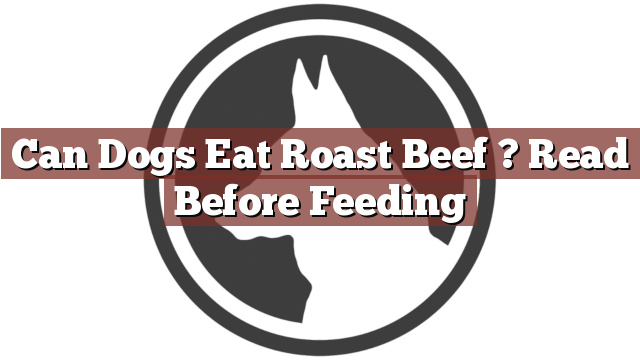Understanding Your Dog’s Dietary Needs
As a responsible dog owner, it’s essential to understand your furry friend’s dietary needs. While dogs are omnivores and can eat a variety of foods, not all human foods are safe for them. It’s crucial to know which foods are safe and suitable for your dog’s consumption to ensure their health and well-being.
Can Dogs Eat Roast Beef? Read Before Feeding
Can dogs eat roast beef? This is a common question that many dog owners have. The answer is yes, dogs can eat roast beef, but it’s important to follow certain guidelines. Roast beef is a good source of protein and other essential nutrients for dogs. However, there are a few things to consider before feeding your dog this tasty meat.
Firstly, it’s crucial to ensure that the roast beef is plain, without any seasonings, spices, or sauces. Some seasonings and spices, such as garlic and onion, can be toxic to dogs and should be avoided. Additionally, any fatty parts of the roast beef should be trimmed off as excessive fat can lead to digestive upset or pancreatitis in dogs.
Pros and Cons of Feeding Roast Beef to Your Dog
Feeding roast beef to your dog has both pros and cons. On the positive side, roast beef is a great source of protein, which is essential for your dog’s muscle development and overall health. It also contains important vitamins and minerals, such as iron and zinc, which contribute to a healthy immune system.
However, there are a few potential drawbacks to consider. One concern is the high fat content in some cuts of roast beef. Excessive fat consumption can lead to weight gain and digestive issues in dogs. Additionally, feeding too much roast beef can upset your dog’s stomach, causing diarrhea or vomiting. It’s important to feed roast beef to your dog in moderation and as part of a balanced diet.
Conclusion: Weighing the Benefits and Risks of Roast Beef for Dogs
In conclusion, while dogs can eat roast beef, it’s important to exercise caution and moderation. Feeding plain roast beef in small quantities can be a nutritious addition to your dog’s diet. However, it’s crucial to avoid seasonings, spices, and excessive fat content. If you choose to feed roast beef to your dog, it’s always a good idea to consult with your veterinarian to ensure that it fits within your dog’s specific dietary needs.
Remember, each dog is unique, and what works for one may not work for another. By understanding your dog’s dietary needs and always making informed choices, you can ensure that your four-legged companion stays healthy and happy.
Thank you for taking the time to read through our exploration of [page_title]. As every dog lover knows, our furry friends have unique dietary needs and responses, often varying from one canine to another. This is why it's paramount to approach any changes in their diet with caution and knowledge.
Before introducing any new treats or making alterations to your dog's diet based on our insights, it's crucial to consult with a veterinarian about [page_title]. Their expertise ensures that the choices you make are well-suited to your particular pet's health and well-being.
Even seemingly harmless foods can sometimes lead to allergic reactions or digestive issues, which is why monitoring your dog after introducing any new food item is essential.
The content provided here on [page_title] is crafted with care, thorough research, and a genuine love for dogs. Nevertheless, it serves as a general guideline and should not be considered a substitute for professional veterinary advice.
Always prioritize the expert insights of your veterinarian, and remember that the health and happiness of your furry companion come first.
May your journey with your pet continue to be filled with joy, love, and safe culinary adventures. Happy reading, and even happier snacking for your canine friend!

